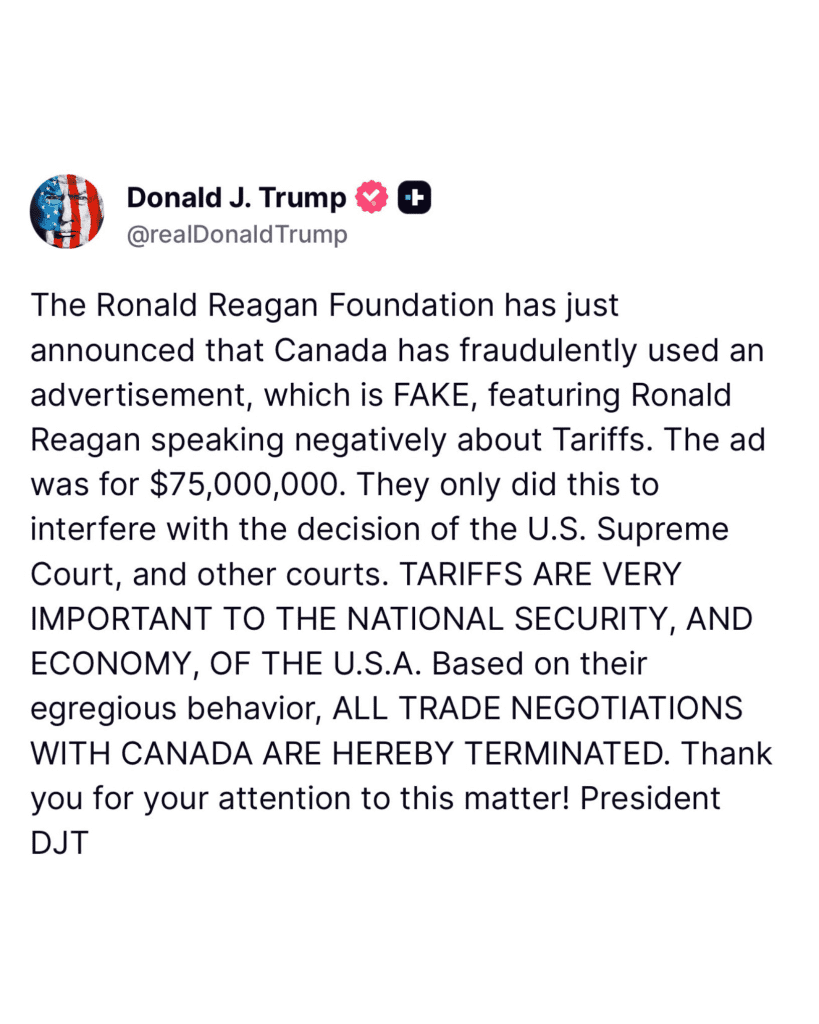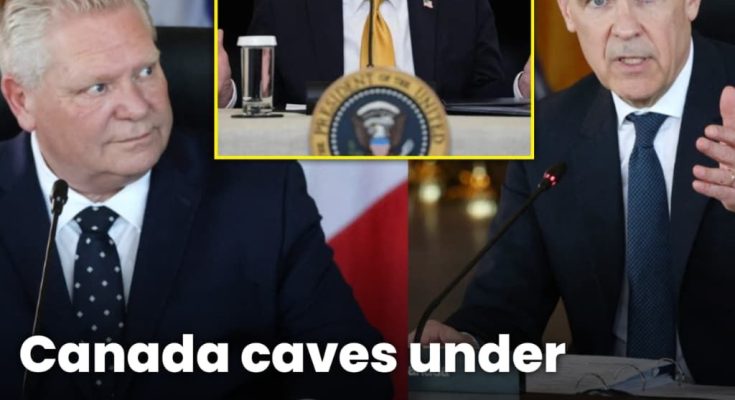Trump Triumphs: Canada Pulls $75 Million Anti-Tariff Ad After U.S. President Exposes ‘Fake’ Ronald Reagan Clip and Shuts Down Trade Talks
What began as a political stunt in Canada has ended in an embarrassing climbdown after President Donald Trump called out Ontario Premier Doug Ford’s government for running a $75 million advertisement that used a 1988 clip of former President Ronald Reagan to criticize American tariffs. Within hours of Trump’s public denunciation and the suspension of U.S.–Canada trade negotiations, the Ford administration abruptly pulled the ad, marking a decisive win for Trump in one of the most intense U.S.–Canadian economic clashes of his second term.

The controversy erupted when the Reagan Presidential Foundation confirmed that the Canadian-funded ad, which featured Reagan speaking against “protectionist tariffs,” had taken the footage out of context. Trump immediately accused Canada of fraudulently misusing Reagan’s words to “illegally influence” the U.S. Supreme Court, which is set to rule on the legality of Trump’s national security tariffs in November 2025. In a strongly worded post, Trump declared that all trade negotiations with Canada were “hereby terminated,” adding, “Tariffs are very important to our national security and economy. Canada has long cheated on tariffs, charging our farmers as much as 400%. Those days are over.”
The reaction in Ottawa and Toronto was swift — and panicked. Facing public scrutiny and a growing backlash over the ad’s legitimacy, Premier Ford’s office confirmed late Friday night that the campaign was being “immediately withdrawn pending review.” Officials reportedly made the decision after receiving word that the Reagan Foundation had issued a formal complaint over the use of the late president’s likeness and message without authorization.

According to insiders, the turnaround came less than twelve hours after Trump ordered U.S. negotiators to suspend all ongoing trade discussions with Canada, effectively halting talks related to auto exports, energy, and agricultural subsidies. “They folded faster than anyone expected,” a senior White House source said. “The message was clear: don’t play games with the United States economy.”
Economists note that Canada’s dependence on the American market remains overwhelming — roughly 75% of its exports are sent directly to the United States, according to 2024 trade data. Trump’s immediate pressure campaign not only demonstrated Washington’s leverage but also underscored his signature “America First” economic philosophy: protecting domestic industries by enforcing fair trade rules and exposing manipulation abroad.

The pulled ad was originally commissioned as part of an Ontario government effort to sway public opinion in both countries against U.S. tariff expansion. Sources within Ford’s administration now admit the ad’s timing — coinciding with a pending Supreme Court hearing on tariff legality — was a “strategic miscalculation.” The Reagan Foundation’s clarification that Reagan had, in fact, supported targeted tariffs to defend American industry completely undercut the campaign’s narrative.
By Friday afternoon, Trump’s tone shifted from outrage to victory. “They got caught,” one senior Trump adviser said. “The ad was fake, the intent was political, and once President Trump exposed it, Canada had no choice but to back off.”

Political analysts have described the episode as another example of Trump’s high-pressure diplomacy, using direct confrontation and public exposure to force concessions from trading partners. Supporters see it as proof of his unwavering commitment to defending U.S. workers and calling out what he sees as decades of unfair treatment by global allies. Critics in Canada, however, are now turning their frustration inward, questioning how Ford’s government allowed such a costly and politically disastrous campaign to proceed.

The fallout has been immediate in Canadian media, with several outlets describing the reversal as “humiliating” and “avoidable.” Even members of Ford’s own party reportedly warned that using Reagan’s legacy against an American president known for his trade assertiveness was a strategic blunder. For Trump, however, it marks another major win — a display of strength that reinforces his broader message of economic independence and national pride.
As the Supreme Court prepares to rule next month on the future of Trump’s tariff policy, his administration is now positioning this episode as proof of America’s dominance in global trade. “Canada can’t survive without us,” one Trump campaign aide said bluntly. “And after this week, they finally remembered that.”



